Introduction
What should you consider when selecting roof decking materials? Your choice of deck base can determine durability and overall cost of your roof decking.
In this detailed article, we will compare popular options in roof decking materials: asphalt, wood, concrete, slate and metal. We will also discuss lifespan, fire safety, noise levels, and storm-proofing of these roof decking materials.
After reading this article, you can determine which materials best fit your budget, home design, and weather. Pick up the perfect roof decking and secure your home with confidence.
Choose carefully – the right foundation decision can increase lifespan of your roof.
Asphalt Composition Shingles
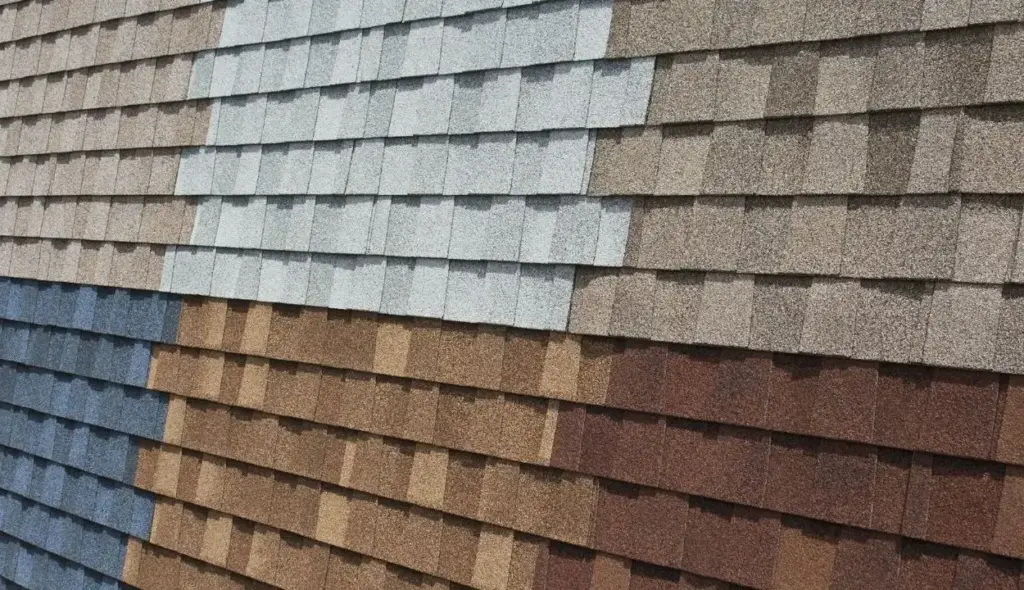
Asphalt shingles are made of fiberglass. It consist of an inner reinforcing mat covered with asphalt and ceramic granules on the outer surface. They come in rectangular strips 12” x 36” or 18” x 36” in size and are among the low budget roof decking materials options.
Appearance
Asphalt shingles come in many neutral, earthy, or mixed color blends. They fit both classic and modern house styles. The texture ranges from smooth straight lines to faux wood, slate or tile.
Durability
Lifespans of asphalt shingles usually reach 20-30 years. Premium ones with extra weatherproof glue and ceramic coatings can last 30+ years. But those upgraded versions cost more upfront. Compare prices to long term savings when choosing shingles.
Fire Resistance
Asphalt shingles get special coatings to meet Class A fire safety rules over time. Special premium varieties receive UL 2218 Class 4 impact resistant certification.
Wind/Storm Resistance
Regular asphalt shingles tolerate winds up to 60 mph before risk of damage. Special reinforced impact resistant versions can withstand winds exceeding 150 mph speeds.
Maintenance
Asphalt shingles require annual inspections to spot and repair cracking/tears . Every 15-25 years, full replacement becomes necessary.
Noise
Asphalt absorbs sound well and does not generate noticeable noise during rainstorms unlike metal or plastic roofs. The granule surface provides a quiet roof deck.
Cost Range
On average, asphalt shingle roof installation runs $80-250 per square including materials and professional fitting labor fees. Architectural luxury grades cost up to $500 per square.
Wood Shingles and Shakes
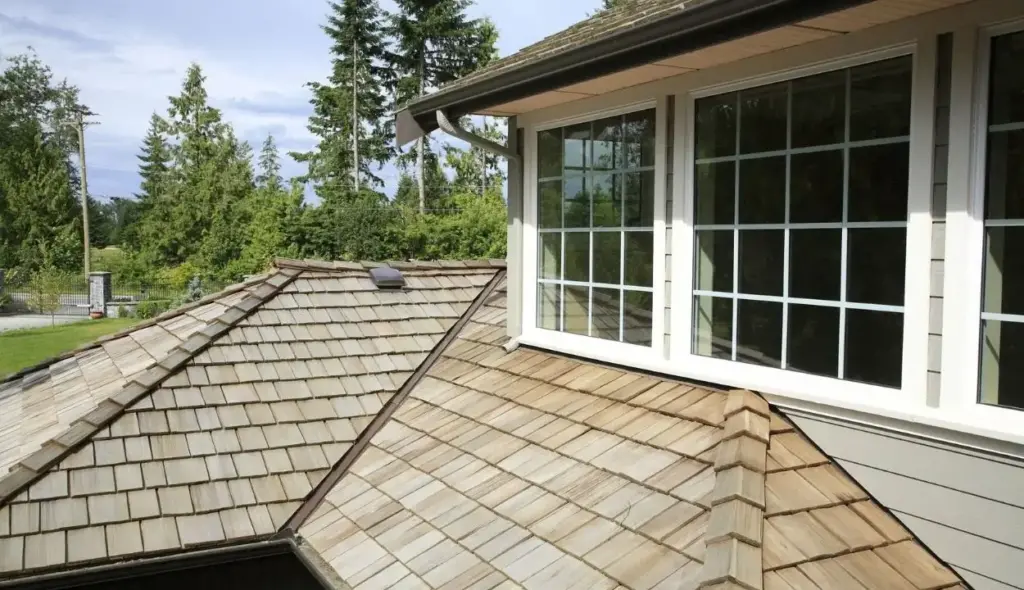
Wood roof decking materials composed of wooden shingles or shakes, which are sawn or split. Both are made from rot-resistant old growth western red cedar and redwood tree species.
Appearance
The wooden shingles used measure between 16 and 24 inches in length and approximately 6 inches in width. The shakes range from 18 to 24 inches long with varied thickness from 1/2 to 1 inch coming in straight or wavy textures. Unfinished cedar turns silvery gray over time.
Durability
Quality wood features natural oils resisting decay for 20-30 years. However, regular staining and sealing is important to prevent cracking, curling or splitting from moisture damage.
Fire Resistance
Untreated softwood catches fire easily. Effective Class B or superior Class A fire retardant chemical treatments prove critical protections, even mandatory in number of fire-prone regions.
Wind/Storm Resistance
Wood performs fairly against wind loads. Sturdier shake installation methods and supplemental sealants improve wind tolerance.
Maintenance
Wood roof decking materials requires re-staining/sealing maintenance every 5-7 years to retain structural integrity, fire and pest resistance.
Noise
Cedar and redwood absorb sound well, providing effective noise insulation benefits. Wood creates no noticeable noise when rained upon.
Cost Range
Installed costs for cedar wood shingles or shakes run $400-1000 per square on average. Premium grades with Class A treatments hit $1200+ range.
Concrete and Clay Tiles

Concrete tiles consist of a cement, sand and gravel mix. Clay tiles involve dense terra-cotta made by baking clay and inorganic materials. Roof tiles measure 10-14 inches across on each side on average.
Appearance
From classic Mediterranean barrel tiles, flat roman tiles to exotic Chinese lucky fish scale tiles, concrete and clay tiles deliver striking visual presence. They often glazed vibrant colors and detailed shapes befitting focal roof accent points.
Durability
Extremely hard, dense construction allows both clay and concrete to endure decades of intense sun, wind, rain and hail exposure.
Lifespan
Properly fastened, quality concrete or terra-cotta tiles last 50-100 years, maintaining water impermeability well year after year.
Fire Resistance
High-fired clay and concrete tiles earn Class A fireproof designation naturally given their non-combustible inorganic mineral content.
Wind/Storm Resistance
Weighing 850-2000 pounds per square installed, tiles offer incredible uplift resistance against 185 mph winds and hurricane blasts. Their overlapping interlocks prevent blow offs.
Maintenance
A simple annual power wash keeps tiles looking clean. Verify attachments every few years. No ongoing sealing or treatments needed.
Noise
Sound deadening abilities rank lower than other materials with some rain patter audible. Loud storms generate noticeable noise runoff.
Cost Range
Concrete and clay tile roofing runs $600-1500 per square installed depending on source origin, thickness, quality grade and delivery fees.
Natural Slate
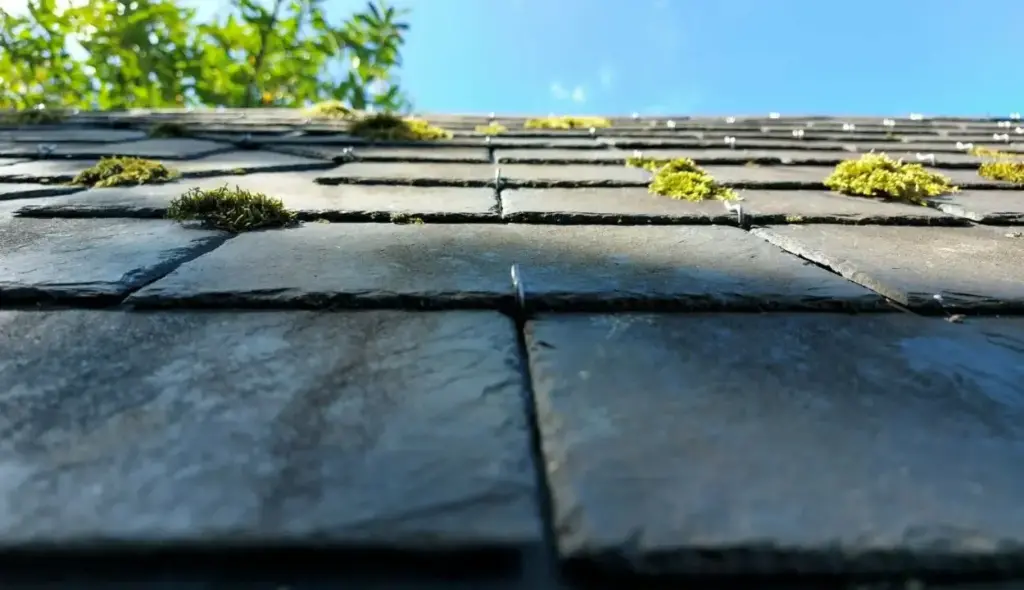
Slate refers to hand-cut and precisely machined shingles sourced from ancient metamorphic rock from Brazil to China. It constitutes some of the premium priciest roofing.
Appearance
Quarried natural stone slate delivers unmatched visuals with textured layers, mineral flecks, graded thicknesses. Sizes ranging from small mosaics to giant slabs for statement custom architectural brilliance.
Durability
As one of the toughest roof decking materials, densest mineral-based decking materials on earth, slate withstands all time and weathering extremes, retaining its structural integrity.
When installed, the remarkable 1000-1500 pounds per square density of slate enables it to endure environmental extremes remarkably well.
Lifespan
Natural slate lasts beyond 100 years routinely thanks to its hardy construction. Well-fitted installations on sound deck foundations simply never require replacements.
Fire Resistance
Entirely non-flammable with a Class A designation, slate performs reliably in the midst of wildfires and provides glowing radiant ember protection.
Wind/Storm Resistance
properly laid slate roofing systems stand strong against fierce gales whipping debris through the air. No blasting winds penetrate their heavy, interlocking slate tiles secured by nails into underlying reinforcements.
Maintenance
Occasionally replace damaged pieces. Moss cleaners may help retain original freshly quarried stone appearance long-term if desired.
Noise
During intense rain and hail, sound reverberations prove noticeable given slate’s hard, smooth finish. Snow slide-off generates muffled thumps.
Cost Range
As a premium bespoke product, natural quarried slate tiles run $1000+ per square installed. Certain imported exotic dense varieties from Spain and China price as high as $2000-3000 per square.
Metal Roofing
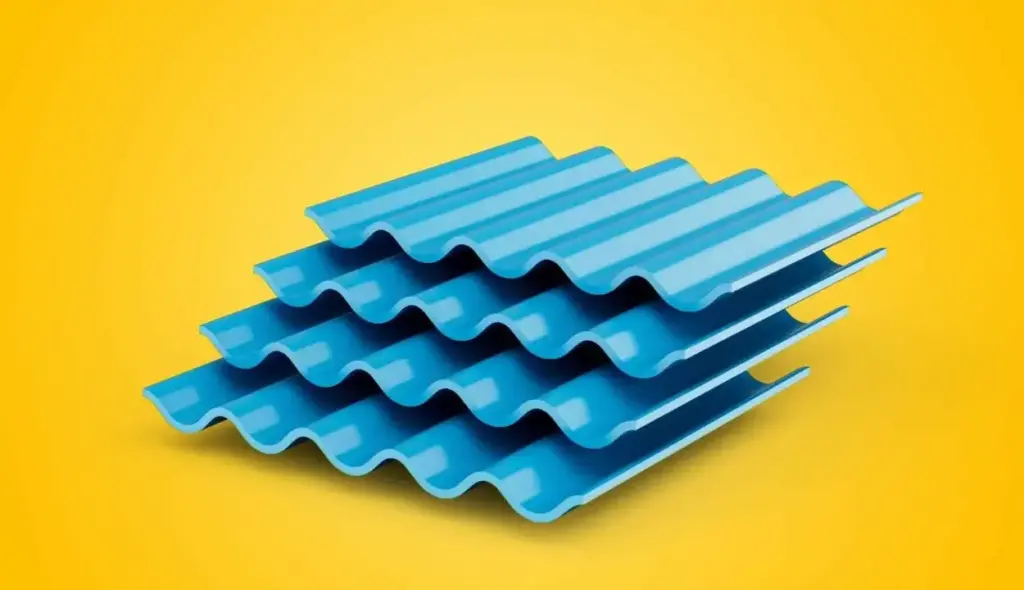
Modern metal roofing includes factory-formed interlocking steel, aluminum, and copper panels coated with special protective finishes to prevent corrosion. It is among the best roof decking materials available in the market.
Originally popularized post-WWII and later revived in the 90’s, architectural metal roofs now claim 10% U.S. market share.
Appearance
Metal panels appear in ribbed or flat form factors lending clean, streamlined facades well-suited for contemporary builds. However, synthetic prints, stone coatings and hardware accessories enable convincing wood shake, tile, and slate disguises also.
Durability
Metal roof decking withstands decades of non-stop exposure to all weather elements through its resilient finishes and water impermeable barriers. Sturdy commercial-grade 29 gauge steel offers enduring performance.
Lifespan
A properly installed metal roof using quality galvanized steel and reinforced seam attachments delivers 60-70+ years of reliable service. Certain copper and lead coated examples last over 100 years.
Fire Resistance
Modern metal achieves UL 2218 Class 4 hail/fire impact ratings. Steel and aluminum substructures do not fuel flames or pose fire hazards.
Wind/Storm Resistance
Interlocking and code-compliant fastening methods allow metal roofs to tolerate sustained winds beyond 175 mph.
Maintenance
Metal requires just occasional seam inspections, debris cleanup and minor paint touch ups to maintain flawless waterproofing for decades without replacement needs.
Noise
Metal roofs amplify rain, hail and snow clatter noticeably. Fortunately, sound-dampening underlayments effectively mute noise.
Cost Range
Installed metal roofing averages $350-700 per square. Certain custom copper and stainless steel versions price upwards of $1000+ per square.
Roof Decking Materials Cost and ROI
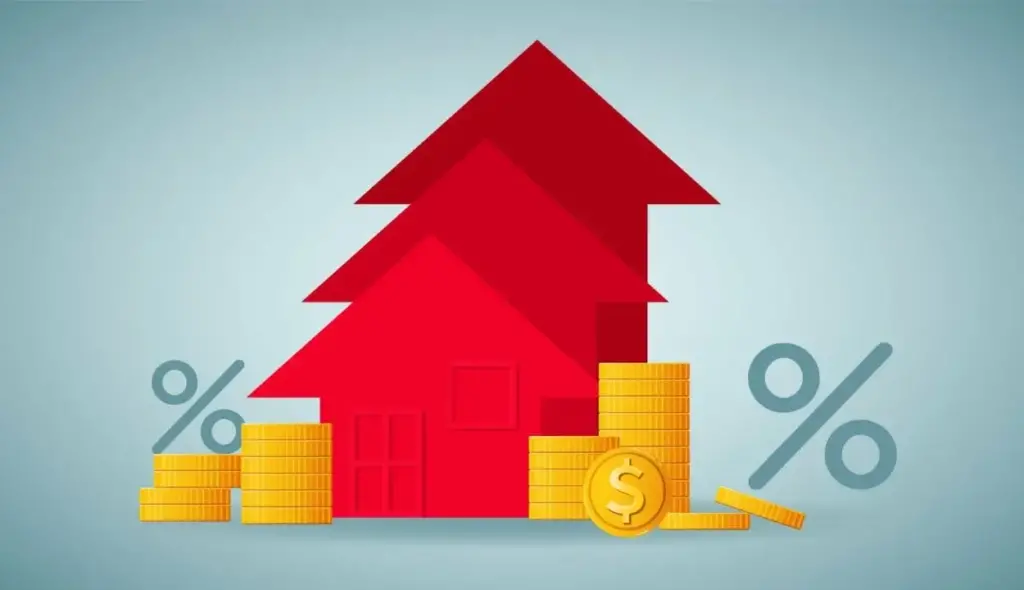
Roof decking materials costs constitute 35-45% of a total roof replacement quote including installation labor and disposal fees of $6,000-12,000 for an average home.
Upgrading roof decking increases home value. Realtor surveys confirm modern architectural style metal roofs in particular boost property resale prices 15-25% over traditional asphalt.
| Roofing Material | Cost per Square | Lifespan (Years) | Cost per Year |
|---|---|---|---|
| Asphalt Shingles | $250 | 20 | $12.50 |
| Concrete Tiles | $350 | 50 | $7.00 |
| Metal Roofing | $600 | 60 | $10.00 |
| Cedar Shakes | $800 | 30 | $26.67 |
| Slate Roofing | $1,000 | 100 | $10.00 |
Energy efficient roofing lowers utility bills. High solar reflective metal roofs may slash indoor cooling by 10-25%.
Conclusion
Climate conditions, installation expertise, maintenance regimes, and desired longevity determine ideal roof decking materials investments for homes.
Asphalt shingles suit budget buyers with their 20-30 year cost-efficiency. For premium lifelong value, concrete tile, metal and 100+ year slate deliver.
Work with qualified local roofing contractors to translate dream home visions into enduring reality.
FAQs
What is the cheapest roof decking materials?
Asphalt composition shingles among the cheapest roof decking materials averaging $80-250 per square installed. They carry shorter 20-30 year warranties however.
What roof lasts the longest?
Slate and copper metal roofs deliver superior longevity, lasting 100+ and 60-70+ years respectively when properly installed and cared for.
What is the best roofing for snow?
Concrete and clay tile, metal, and rubber roofs easily allow snow slide-off without accumulating strain. Standing seam metal handles heavy snow loads.
What roofs hold up best in hurricanes?
Impact resistant concrete, ceramic tile, plus Class 4 hurricane-rated asphalt and metal roofing provide exceptional wind uplift protection exceeding 150 mph.
Which roof decking looks the nicest?
Natural slate and wood shake exude unrivaled rustic beauty. Modern metal roofs and concrete tiles also offer elegant visual curb appeal.

